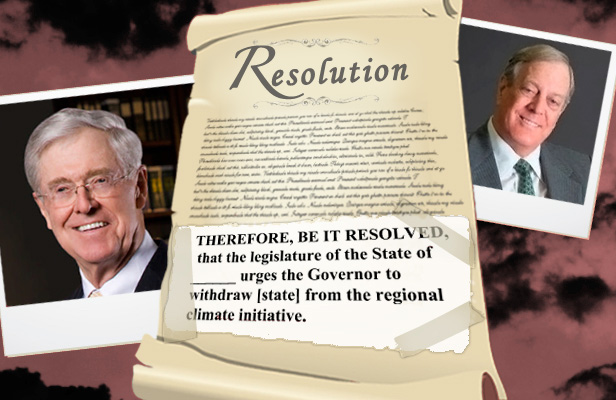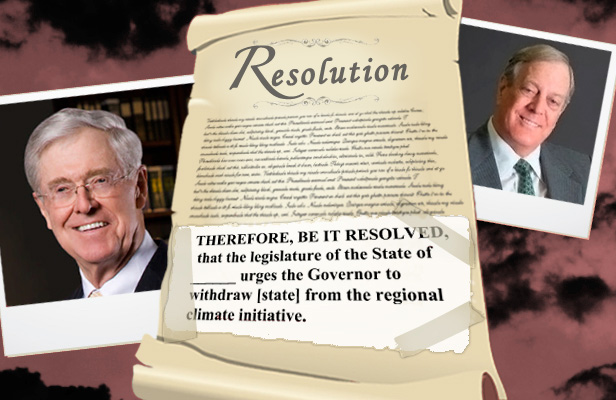 Fresh off last year’s successful defeat of federal climate legislation in the U.S. Senate, the oil baron Koch brothers and their dirty-energy buddies are now bent on dismantling one of the nation’s last hopes for doing anything about climate change in the near term: regional climate accords.
Fresh off last year’s successful defeat of federal climate legislation in the U.S. Senate, the oil baron Koch brothers and their dirty-energy buddies are now bent on dismantling one of the nation’s last hopes for doing anything about climate change in the near term: regional climate accords.
Today, a total of 32 states are active participants or observing members in the Regional Greenhouse Gas Initiative in the Northeast, the Midwestern Greenhouse Gas Reduction Accord, or the Western Climate Initiative.
That number will get a lot smaller if the American Legislative Exchange Council — a D.C.-based conservative advocacy organization funded by Koch family foundations, ExxonMobil, and other oil companies and big corporations — gets its way.
ALEC offers legislative templates to state lawmakers who don’t want the hassle of writing their own conservative bills. Raegan Weber, ALEC’s senior director of public affairs, says the group has produced 800 to 1,000 pieces of so-called “model legislation.” Access to those templates is restricted to legislators who pay $100 for a two-year membership, which makes it difficult to trace a bill’s language back to ALEC.
But thanks to a blog post by a conservative states-rights activist in Florida (and a tidbit in one of ALEC’s own press releases), we can make out at least part of what’s in ALEC’s template for “State Withdrawal from Regional Climate Initiatives,” one of the offerings on the group’s environment webpage. And it looks like the template has been getting a lot of use lately.
Language that regurgitates all of the right’s favorite — and in many cases fallacious — anti-cap-and-trade talking points has cropped up in nearly identical form in resolutions or bills in at least six states:
WHEREAS, there has been no credible economic analysis of the costs associated with carbon reduction mandates and the consequential effect of the increasing costs of doing business in the State of ______;
WHEREAS, forcing business, industry, and food producers to reduce carbon emissions through government mandates and cap-and-trade policies under consideration for the regional climate initiative will increase the cost of doing business, push companies to do business with other states or nations, and increase consumer costs for electricity, fuel, and food;
WHEREAS, the Congressional Budget Office warns that the cost of cap-and-trade policies will be borne by consumers and will place a disproportionately high burden on poorer families;
WHEREAS, simply reducing carbon emissions in the State of ______ will not have a significant impact on international carbon reduction, especially while countries like China, Russia, Mexico, and India emit an ever-increasing amount of carbon into the atmosphere;
WHEREAS, a tremendous amount of economic growth would be sacrificed for a reduction in carbon emissions that would have no appreciable impact on global concentrations of CO2;
WHEREAS, no state or nation has enhanced economic opportunities for its citizens or increased Gross Domestic Product through cap and trade or other carbon reduction policies; and
WHEREAS, Europe’s cap and trade system has been undermined by political favoritism, accounting tricks and has failed to achieve the carbon reduction targets,
THEREFORE, BE IT RESOLVED, that the legislature of the State of ______ urges the Governor to withdraw [state] from the regional climate initiative.
Last year in Michigan, the language appeared in a resolution [PDF] introduced in the state House of Representatives, demanding that the state drop out of the Midwestern Greenhouse Gas Reduction Accord.
This year, the language has shown up in resolutions in Montana, New Mexico, Oregon, and Washington [PDFs] calling for the states to quit the Western Climate Initiative.
In New Hampshire, it popped up in the “findings” section of a House bill that would repeal the cap-and-trade system established under the Regional Greenhouse Gas Initiative (RGGI). The bill’s lead sponsor, state Rep. Richard Barry (R), looked a bit like a dog caught with the family cat in its mouth when he was asked to explain the language at a public hearing; he nervously said that none of the bill’s sponsors had written this particular section, but stopped short of revealing ALEC as the source of the text. That didn’t sit well with Rep. James Garrity (R), chair of the House Science, Technology, and Energy Committee, who later explained, “Our committee does not feel that editorials belong in laws.” The matter was resolved by dropping the ALEC text, and the amended bill went on to pass the House.
The New Mexico resolution hasn’t fared so well; it stalled in committee, according to sponsor Rep. Tim Lewis (R). Unlike Barry in New Hampshire, Lewis readily acknowledges that the language in his resolution came from ALEC, but adds, “I am not a member of that group.” A first-term legislator who’s still busy learning the ropes in Santa Fe, Lewis admits he didn’t put much time into examining ALEC’s claims about cap-and-trade. As a teacher, he might be unhappy to learn the copycat text is full of questionable claims (find out just how questionable).
“I don’t mind being an observer in the Western Climate Initiative,” says Lewis, who is proud to support wind and solar power. He says he just worries that implementing cap-and-trade policies could hurt poor families in his state. Sound familiar?
Oregon state Rep. Kim Thatcher (R), sponsor of the resolution in her state, seems to be more thoroughly on board with the Koch brothers’ agenda. An aide to the lawmaker, who spoke on condition of not being named, said Thatcher contacted all the right groups before moving forward with the resolution, including: Americans for Prosperity, a Koch-funded organization that has been waging a very public assault on regional climate accords (get that story); the Heritage Foundation, recipient of more than $3.3 million in Koch funds from 1997 to 2008; and the Cascade Policy Institute, considered by Koch Industries to be one of the few reputable sources of information on “climate controversies.” For now, the resolution is stuck in committee.
In 2010, Greenpeace published a report about the Koch brothers’ funding of climate-denial groups, and Koch Industries responded by saying, “we believe science — not politicized opinion — must play a central role in the discussion about climate and related policy proposals. Both a free society and the scientific method require an open and honest airing of all sides.”
Can we look forward to an open airing of the ALEC text that’s being surreptitiously slipped into state-level bills and resolutions around the country? And will we see the text corrected so that it is in fact honest and all “politicized opinion” is removed?
Read more:
- A debunking of questionable claims in the ALEC template
- Koch-funded Americans for Prosperity wages frontal assault on regional climate accords
- Regional cap-and-trade saves jobs and money
- The big-picture outlook for regional cap-and-trade agreements
ALEC’s questionable claims about climate policies
The American Legislative Exchange Council’s “model legislation” for “State Withdrawal from Regional Climate Initiatives” is full of debatable and debunkable assertions. It starts off:
WHEREAS, there has been no credible economic analysis of the costs associated with carbon reduction mandates …
In fact, there have been dozens upon dozens of such analyses. Environmental Defense Fund rounded up some of the best. Even while denying that any credible studies have been done on costs, the template goes on to claim that all sorts of costs are looming.
WHEREAS … cap-and-trade policies [et al] … will … increase consumer costs for electricity …
By no means do carbon-cutting policies have to lead to higher electricity costs for Americans — it depends on the specific kind of system implemented. For example, an EPA analysis of the Waxman-Markey climate bill in U.S. House found that it would lower average household utility bills.
WHEREAS, the Congressional Budget Office warns that the cost of cap-and-trade policies … will place a disproportionately high burden on poorer families
The CBO actually found that a cap-and-trade system could lower costs for low-income households if implemented the right way.
WHEREAS, a tremendous amount of economic growth would be sacrificed for a reduction in carbon emissions …
EDF’s roundup of economic analyses concludes that the “cost of capping global warming pollution over the next two decades is almost too small to measure.”
WHEREAS, no state or nation has enhanced economic opportunities for its citizens or increased Gross Domestic Product through cap and trade or other carbon reduction policies
Many analyses reach an opposite conclusion. A 2010 study by the California Air Resources Board projected that many parts of the state’s economy will grow, and the overall economy will not suffer, under its climate-change law. Germany, which has an aggressive pro-renewables policy, has grown the number of jobs in its renewables sector by 87 percent since 2004, according to a 2010 report, more than offsetting job losses that resulted from efforts to de-carbonize the nation’s economy. An analysis by Trevor Houser and his colleagues at the Peterson Institute for International Economics points to lots of potential job growth that could result from national climate policies.
WHEREAS, Europe’s cap and trade system has been undermined by political favoritism [and] accounting tricks …
The European Union’s system has had problems, but they’re totally fixable. And there’s no reason to believe those mistakes would be repeated in the U.S.; on the contrary, American wonks have been watching closely and will make sure not to replicate Europe’s errors. In the U.S., RGGI’s cap-and-trade system has been operating smoothly since 2008 with no evidence of fraud or manipulation, according to independent monitors; other non-carbon cap-and-trade markets in the U.S. have been running smoothly for decades.
There’s plenty of room for debate about the potential effects of climate policies, but ALEC’s predictions of gloom and doom have little basis in reality and are certainly not “facts” that state lawmakers of any persuasion should want to enshrine into legislation.
Americans for Prosperity wages attack on regional climate accords
Americans for Prosperity (AFP) — a Tea Party-affiliated group founded and funded by David H. Koch of Koch Industries — is mounting a frontal assault on regional climate initiatives.
In New Hampshire, in the run-up to a vote on a House bill that would repeal the cap-and-trade system established under the Regional Greenhouse Gas Initiative, AFP’s state branch hounded voters with robocalls, asking them to demand that their state reps support the measure. After the bill passed, AFP Vice President for Policy Phil Kerpen and AFP’s New Hampshire State Director Corey Lewandowski celebrated with an op-ed published by Fox News.
In New Jersey, AFP is putting pressure on Gov. Chris Christie (R) to drop out of RGGI, and has launched a TV and radio ad campaign in the state arguing that RGGI will drive electric rates “through the roof,” resulting in “higher taxes, lost jobs, and less freedom.” The group has also been pressuring Maine Gov. Paul LePage (R) to pull out.
In Arizona, AFP started publicly campaigning in 2009 to get the state to withdraw from the Western Climate Initiative. Its efforts paid off in February 2010 when Arizona Gov. Jan Brewer (R) issued an executive order announcing that the state would not participate in a cap-and-trade system under WCI, though she stopped short of pulling the state out of the accord entirely.
In Michigan, AFP is pushing new GOP Gov. Rick Snyder to reject the Midwestern Greenhouse Gas Reduction Accord. A post on the AFP Michigan site praises a 2010 resolution (with ALEC language) that would have pulled the state out of the accord, and warns, “Similar resolutions will be introduced by legislators in Wisconsin, Iowa and Minnesota.”
For more, check out the AFP website’s “RGGI Repeal Resource” page.




